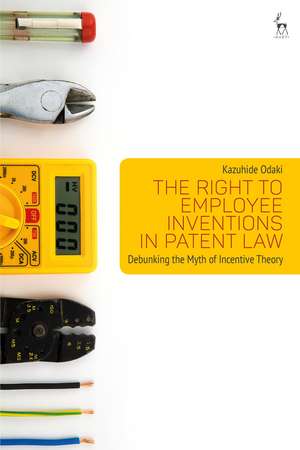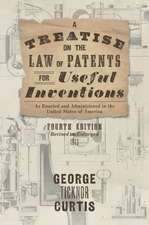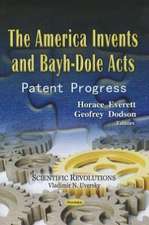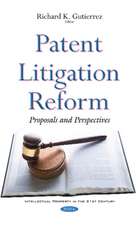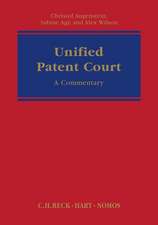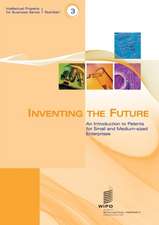The Right to Employee Inventions in Patent Law: Debunking the Myth of Incentive Theory
Autor Kazuhide Odakien Limba Engleză Paperback – 27 ian 2021
| Toate formatele și edițiile | Preț | Express |
|---|---|---|
| Paperback (1) | 230.43 lei 6-8 săpt. | |
| Bloomsbury Publishing – 27 ian 2021 | 230.43 lei 6-8 săpt. | |
| Hardback (1) | 497.48 lei 3-5 săpt. | |
| Bloomsbury Publishing – 17 oct 2018 | 497.48 lei 3-5 săpt. |
Preț: 230.43 lei
Preț vechi: 296.90 lei
-22% Nou
Puncte Express: 346
Preț estimativ în valută:
44.09€ • 48.05$ • 37.15£
44.09€ • 48.05$ • 37.15£
Carte tipărită la comandă
Livrare economică 23 aprilie-07 mai
Preluare comenzi: 021 569.72.76
Specificații
ISBN-13: 9781509943913
ISBN-10: 1509943919
Pagini: 232
Dimensiuni: 156 x 234 x 16 mm
Greutate: 0.33 kg
Editura: Bloomsbury Publishing
Colecția Hart Publishing
Locul publicării:London, United Kingdom
ISBN-10: 1509943919
Pagini: 232
Dimensiuni: 156 x 234 x 16 mm
Greutate: 0.33 kg
Editura: Bloomsbury Publishing
Colecția Hart Publishing
Locul publicării:London, United Kingdom
Caracteristici
Draws on research from a number of disciplines: law, social psychology and econometrics.
Notă biografică
Kazuhide Odaki has a PhD in Law from the University of Manchester.
Cuprins
1. IntroductionI. Background and Purpose of this Book II. Scope and Contents of the Book PART IFINANCIAL INCENTIVES AND THE MOTIVATION, PRODUCTIVITY AND CREATIVITY OF EMPLOYEE INVENTORS2. Motivation of Employee Inventors and the Effect of Incentives on their Productivity I. Practice of Compensation to Employee Inventors II. The Motivation-Hygiene Theory: Criticism and its Usefulness III. Job Satisfaction and Motivation of Scientists and Engineers IV. Motivation to Invent: Evidence from PatVal-I/II and RIETI Surveys V. Financial Incentives and the Productivity of Employee Inventors 3. Inventor Remuneration in the Organisational Context I. Serendipity and Corporate Hierarchy II. Teamwork in Inventing III. Individualism, Collectivism and the Effect of Inventor Remuneration 4. Monetary Rewards and the Creativity of Employee Inventors I. Controversy over the Effect of Monetary Rewards II. General Discussion III. Analysis of Legal Schemes for Inventor Remuneration IV. Factors that Facilitate Workplace Creativity and Innovation V. Case Study: 3MVI. Summary of Part I PART IIOWNERSHIP OF EMPLOYEE INVENTIONS AND THE VALIDITY OF THE INVENTOR PRINCIPLE5. Legitimacy of Employer Ownership I. Rationale 6. The United States I. Significance of the Patent and Copyright Clause: Adding the Fuel of Interest to the Fire of Genius II. The 'Hired to Invent' Rule III. The Shop Right Rule IV. Pre-invention Assignment Agreements7. Other Common Law Countries I. England and Wales II. Australia, Canada and Other Common Law Jurisdictions 8. Inventions Made by University Researchers I. The Victoria University of Technology and University of Western Australia Cases II. Open Science and the Issue of Patenting Academic InventionsIII. Ownership of Academic Inventions9. Civil Law Countries I. Germany II. Japan III. Summary of Part II 10. General Conclusion I. Summary of the Argument II. Policy Implications III. Theoretical Implications
